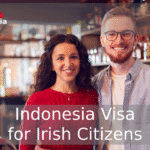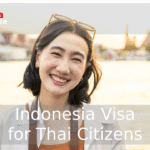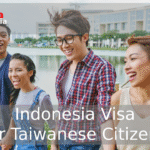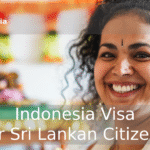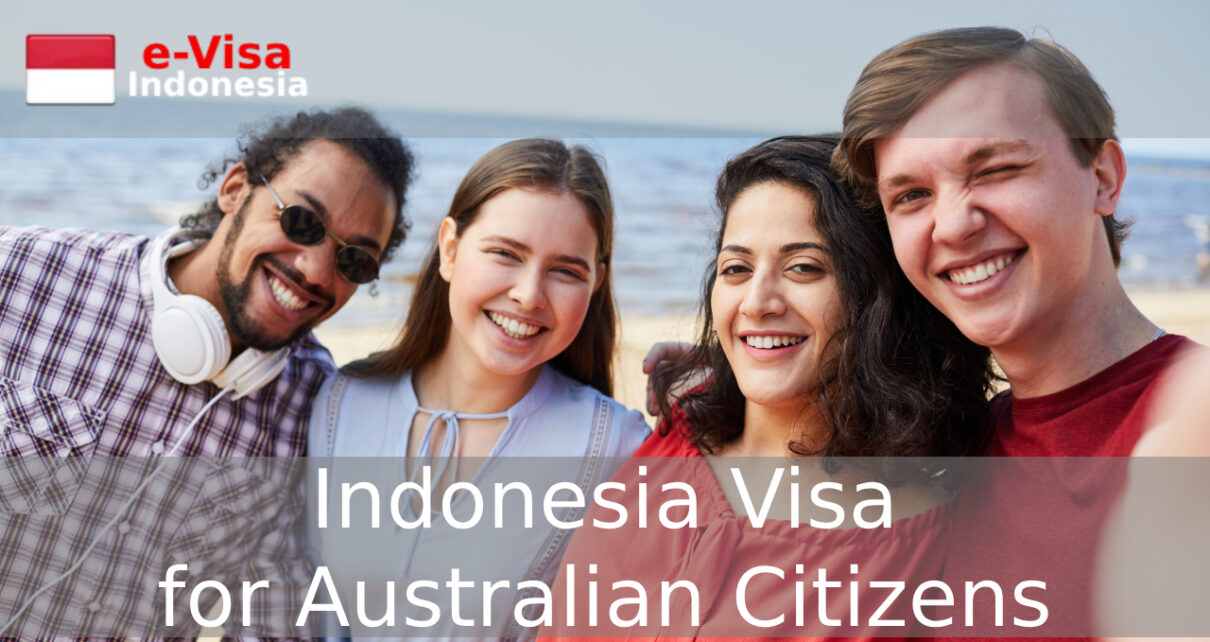
Australian citizens visiting Indonesia have several entry options depending on the length and purpose of their trip.
For leisure stays of up to 30 days, Australians can apply for a Visa on Arrival (VOA, B1 type), which allows an initial 30-day visit and can be extended once for an additional 30 days.
Alternatively, a Tourist Single-Entry Visitor Visa (C1 type) grants a visit of up to 60 days and must be arranged online prior to a trip.
For longer stays or other travel purposes, additional Indonesia visa types are available.
Entry into Indonesia requires a passport with at least 6 months of validity from the date of entry, along with supporting documents.
NOTE: For more information, contact theIndonesian Ministry of Foreign Affairs directly or visit their official website.
Types of Indonesian Visas Available for Australians
Indonesia offers a variety of visa options that suit different travel purposes.
Below is an overview of the main visa categories for Australian citizens seeking to visit Indonesia.
Tourism Visas
A Tourism Visa is intended for foreigners who wish to visit Indonesia for holidays, sightseeing, or leisure stays. The most popular options for Australian citizens are a Visa on Arrival (B1) and a Tourist Single-Entry Visitor (C1).
- Visa on Arrival
The Visa on Arrival is designed for recreation, personal development, or seeing tourist attractions, as well as attending business-related meetings, negotiations, or field observations.
Additionally, the visa allows for participation in medical-related activities or visiting family and friends. The duration of the Indonesia VOA is 30 days, with the option to extend for an additional 30 days.
Applicants need a passport valid for at least 6 months and an outbound ticket from Indonesia.
- Tourist Single-Entry Visitor
The Indonesian Tourist Visa allows stays of up to 60 days, with a 30-day extension option.
It’s perfect for tourism, social visits, or non-commercial events like sightseeing, visiting family, or attending conventions as a participant.
Key requirements include a passport with a 6-month validity, a bank statement with a minimum balance of USD $2000, and a recent face photo.
Other Types of Visas to Indonesia
There are several types of visas available beyond Tourist Visas, each designed to accommodate specific purposes such as work, study, or residency.
- Government & Business Visas suit official government visits, business meetings, investment planning, and corporate events, but do not permit permanent employment (e.g., B4 Visa on Arrival, C2 Business Visa, or C10 Business Event Visa)
- Crew Visas apply to foreign crew members working on ships, airlines, or other international transportation entering Indonesia (e.g., C13 Foreign Crew Visa, A36 Visa Exemption, and A37 Visa Exemption).
- Work & Training Visas are for Australians undertaking temporary work, projects, training, or filmmaking activities in Indonesia. These visas range from short-term to longer stays (e.g., C15 Emergency Work Visa, C22 Internship Visa, or E35 Work and Tour Visa).
- Study & Education Visas support students, researchers, and academic program participants involved in formal studies, research, or language learning in Indonesia (e.g., E29 Scientific Research Visa, E30A Student Visa, or E30B Education Visa).
- Family Visas enable travelers to join or reunite with relatives in Indonesia, such as spouses, children, or parents of citizens or residents (e.g., E31A Family Visa, E31B Family Visa (Spouse of ITAS/ITAP Holders), E31G Family Visa (Parents).
- Former Indonesian Citizens Visas assist former Indonesian nationals and their families in returning or staying in Indonesia for extended periods (e.g., E32A Visa for Former Indonesian Citizens, E32C Visa for Former Citizens, and E32D Visa for Former Citizens).
- Investment Visas are designed for those intending to invest in or establish businesses in Indonesia, including setting up companies or branches (e.g., E28A Investment Visa, E28B Investment Visa, or E28C Investment Visa).
- Long-Term & Special Stay Visas cover unique groups, such as retirees, remote workers, or skilled individuals, offering extended residency without employment rights (e.g., E33 Second Home Visa, E33A Special Skills Visa, or E33C World Figure Visa).
- Medical Visas help Australian nationals receive healthcare or medical treatment in Indonesia, including surgeries or specialized procedures (e.g., C3 Medical Treatment Visa, D3 Medical Treatment Visa, and E33G Medical Visa).
- Culture, Arts & Media Visas are issued for cultural exchanges, artistic performances, media assignments, or film-related activities in Indonesia (e.g., C5 Media & Press Visa, C7 Art & Cultural Activity Visa, and C7A Music Performance Visa)
- Sports Visas accommodate athletes, coaches, or officials partaking in sports competitions or training programs in Indonesia (e.g., C8A Sports Visa, C8B Sports Visa, and D8A Sports Visa).
- Other Special Visas include unique cases such as court-related matters, religious missions, or technical duties (e.g., C21 Judicial Proceeding Visa, C10A Preacher Visa, and C17 Business Visa (Audit & Inspection)).
These specialized visas ensure that Australian nationals engaging in specific activities within Indonesia comply with the country’s immigration regulations while contributing to their respective fields.
Required Documents for an Indonesia Visa for Australian Citizens
When obtaining an Indonesian visa, Australian citizens are required to prepare specific documentation to have a smooth application process.
Below are the general requirements:
- Passport: The document must be valid for at least 6 months from the date of arrival in Indonesia is mandatory.
- Face photograph: A recent color photo with a neutral expression is commonly required.
- Supporting documents: Additional files depend on the type of visa being applied for. For instance, a tourist visa may require proof of accommodation or a return flight ticket, while a business visa might necessitate an invitation letter from an Indonesian company.
It is essential to check the specific conditions for the Indonesian visa type before submission to avoid delays or complications.
How to Apply for an Indonesian Visa
Australian citizens willing to get a visa to Indonesia can do it by completing a few simple steps and paying the fees online.
For instance, the instructions for the digital process of C1 Visa are as follows:
- Visit the official e-Visa website at https://evisa.imigrasi.go.id/ and click the “Apply” button to start your application.
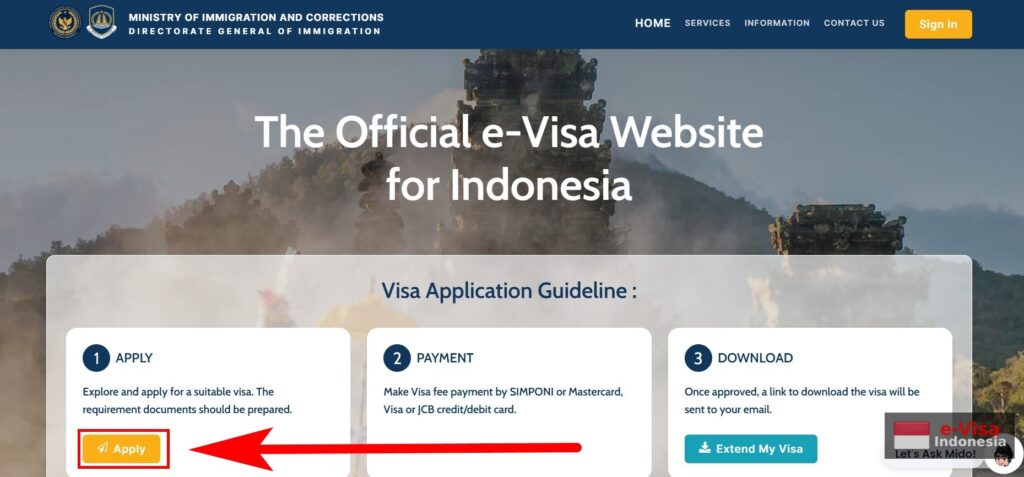
- Select your passport country from the dropdown menu to move forward.
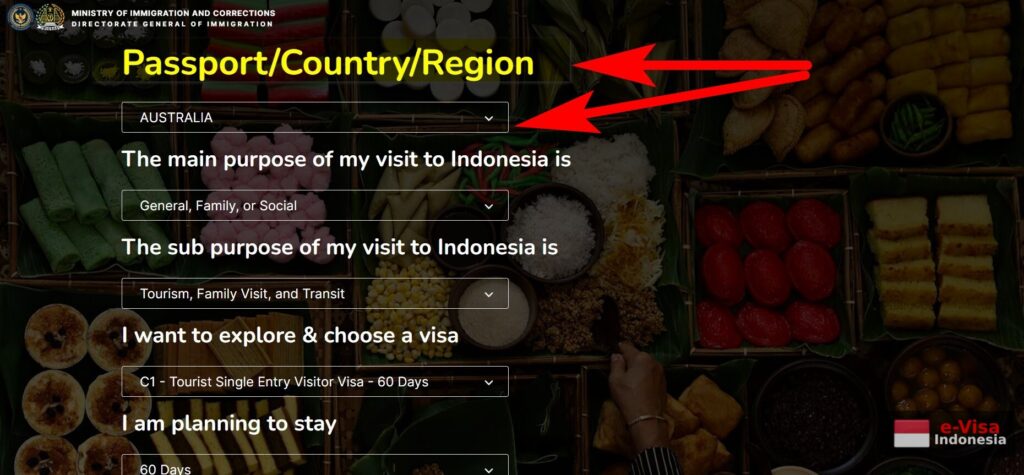
- Choose the main purpose of your visit from the categories provided.
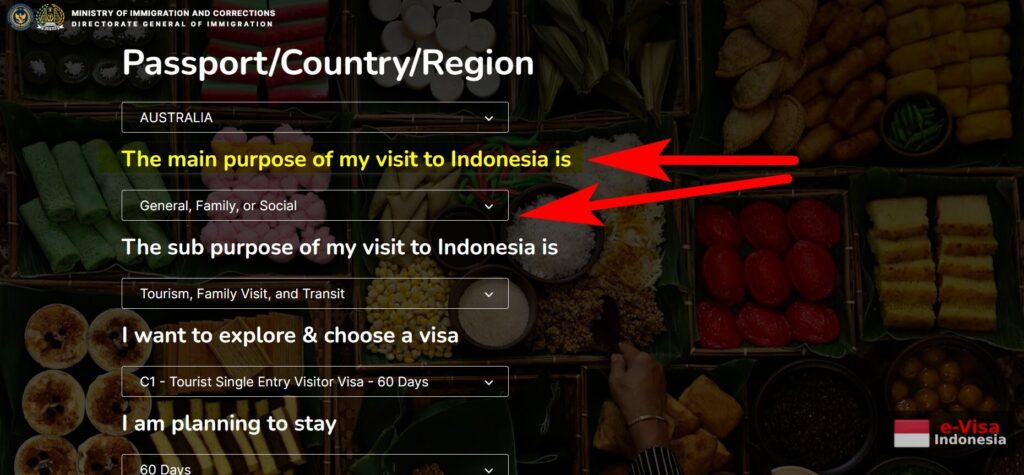
- Pick the sub-purpose of your visit for additional details about your trip’s objective.
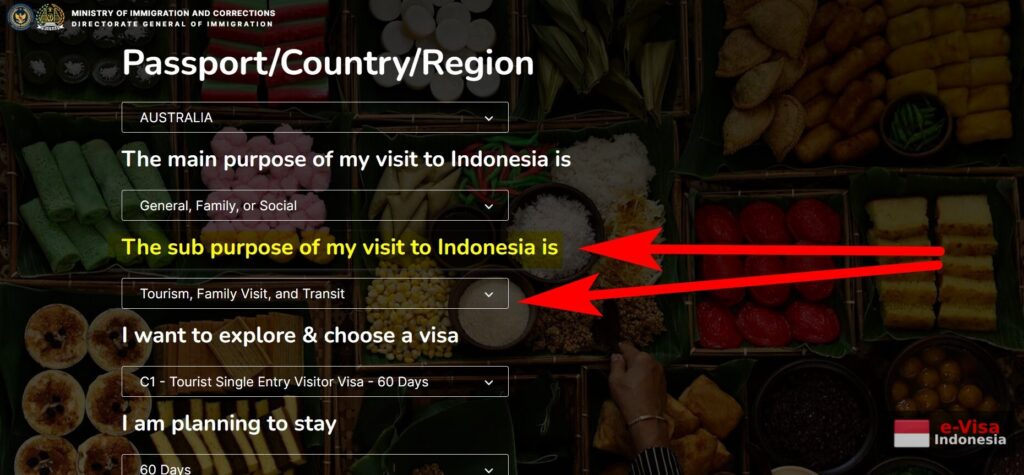
- Determine the visa type based on your selected purpose and sub-purpose.
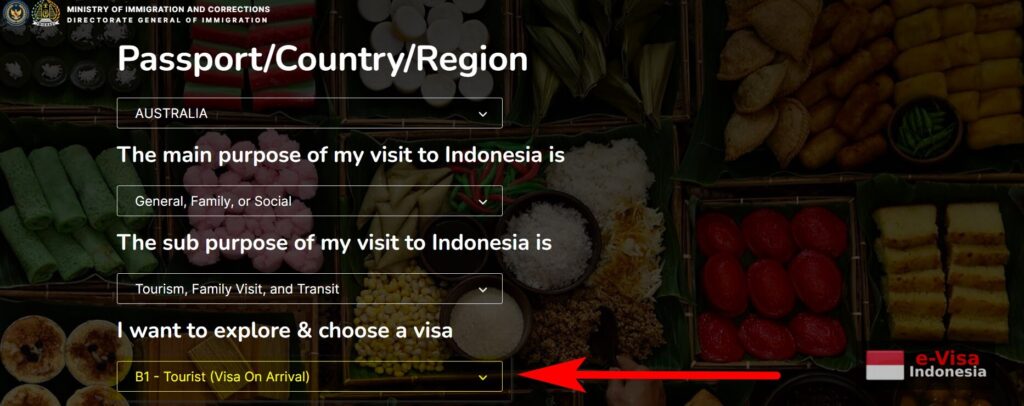
- Set your desired period of stay by choosing the appropriate duration.
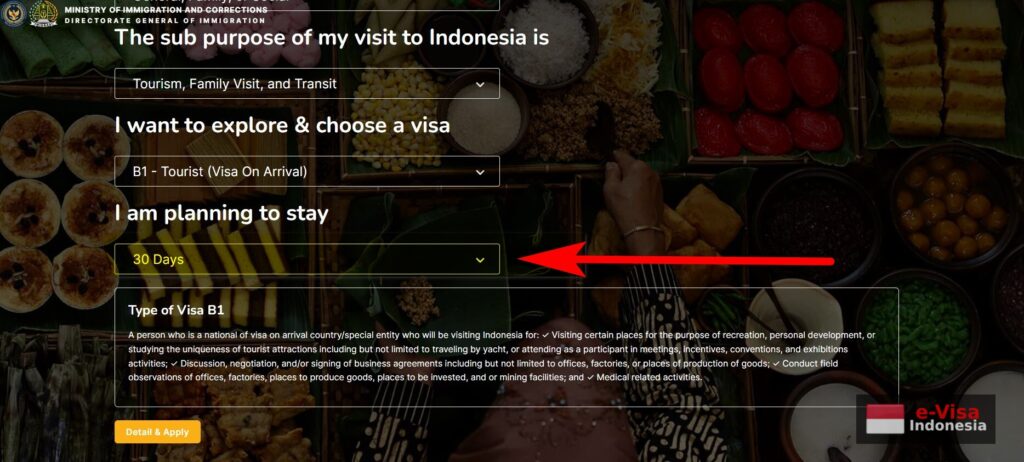
- Click “Detail and login” to proceed to the next step.
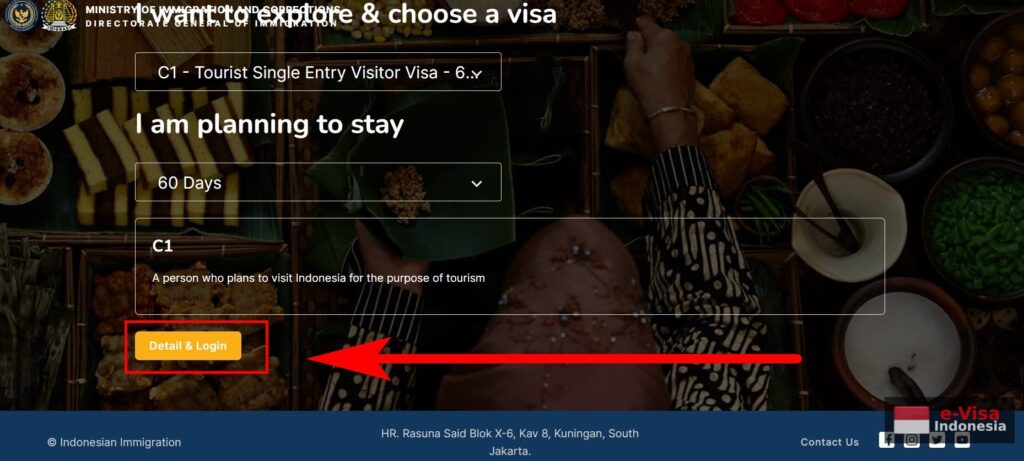
- Review the visa details carefully and click “Apply” to continue.
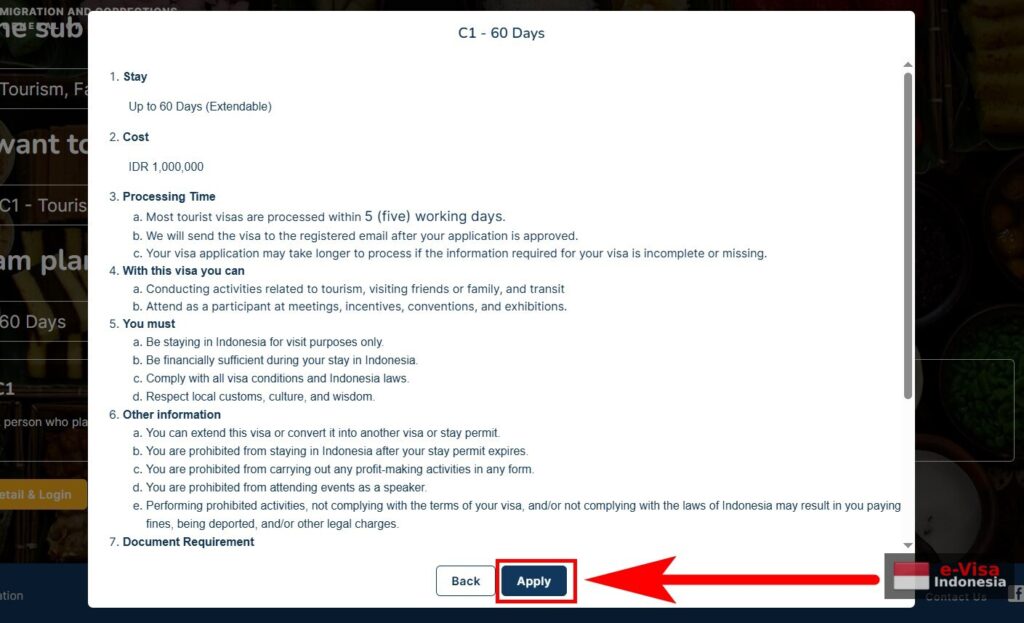
- Confirm that you are applying for a personal visa, not on behalf of a guarantor.
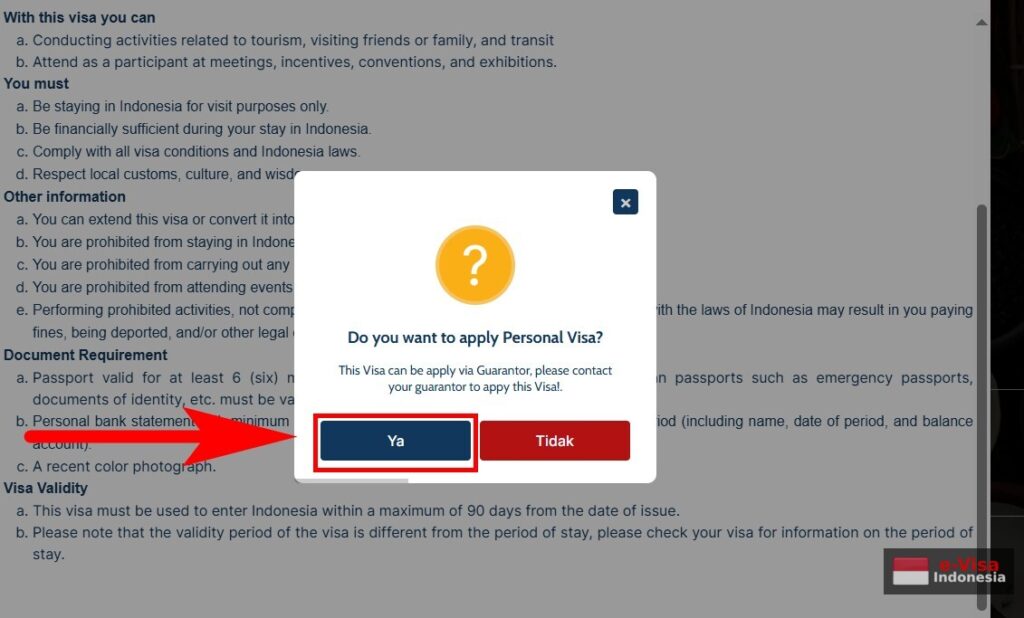
- Log in to your account with your credentials, or create a new account if you don’t have one.
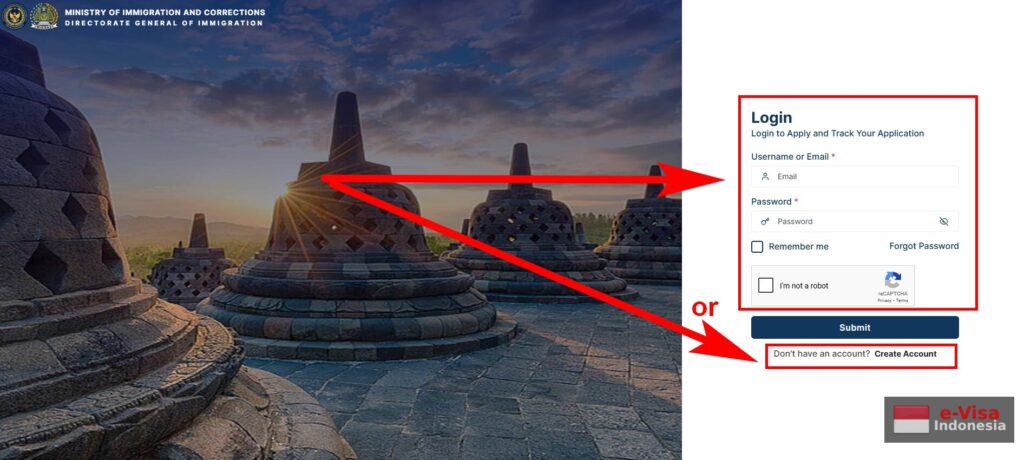
- Register as a “Foreigner” when creating a new account and follow the instructions.
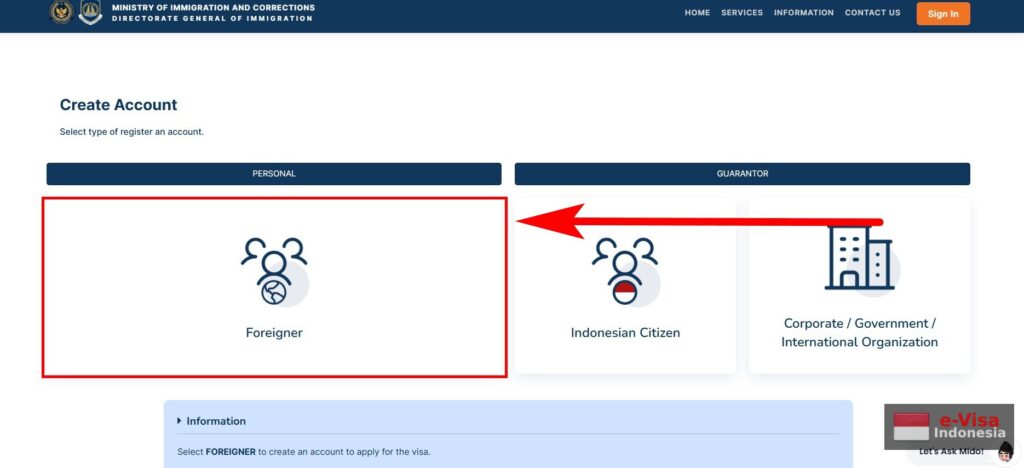
- Fill out the registration form with accurate personal details and click “Submit”.
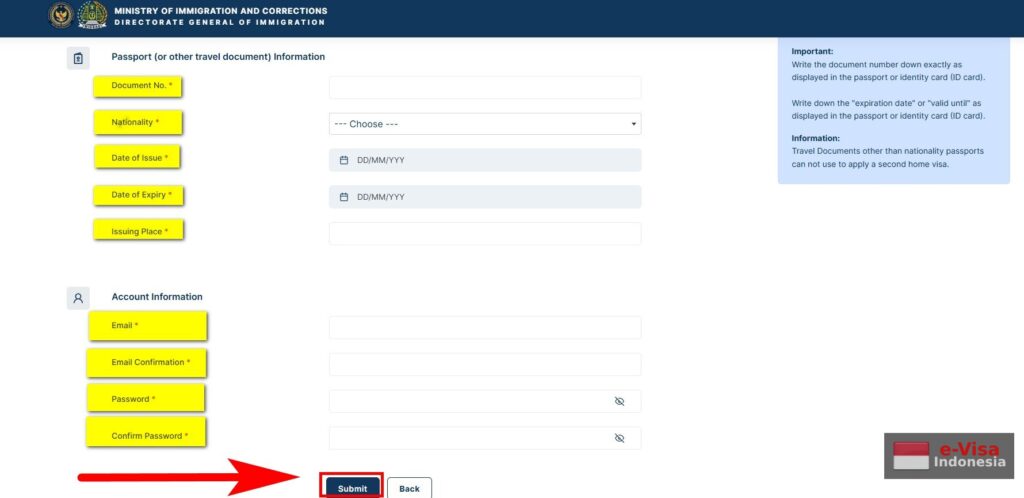
- Make the payment using Visa, Mastercard, or JCB within 120 minutes to avoid expiration.
- Allow up to 5 working days for processing and track your application status by logging into your account.
- Download and print your e-Visa once approved by clicking “Download e-Visa”.
- Carry the printed e-Visa with you during travel, as immigration officers will check it upon arrival in Indonesia.
By following these steps carefully, applicants from Australia can successfully obtain their Indonesian e-Visa with ease.
NOTE: The Visa on Arrival can be obtained directly at the designated visa counter upon arrival. Australians should pay via a digital payment method such as SIMPONI and receive a visa voucher printed on security paper as proof of payment.
Processing Time
The processing time for an Indonesian visa is based on its type. In the case of the C1 Visa, it is 5 working days after the visa payment is received.
![]() Australians should ensure they complete their applications and make the necessary payments well in advance of their intended travel dates to avoid any potential delays.
Australians should ensure they complete their applications and make the necessary payments well in advance of their intended travel dates to avoid any potential delays.
For those obtaining VOAs, the processing time is significantly shorter, typically completed within 24 hours after the payment has been successfully made.
Residency Visas typically take longer to review, often requiring several weeks. This is because they involve a thorough assessment of the applicant’s files, background, and eligibility to make sure all conditions are met for long-term residency.
It is important for Australian travelers to double-check that all required documents are accurate and submitted on time, as incorrect submissions could lead to processing issues.
Indonesia Visa Stay, Validity, and Extensions
The duration of stay in Indonesia for Australian citizens depends on the type of visa obtained. For example, a Visa on Arrival (VOA) allows tourists to stay for up to 30 days, with the possibility of a single extension for an additional 30 days.
Meanwhile, C1 e-Visa holders can stay for an initial period of up to 60 days, with multiple extensions permitted for a total stay of up to 180 days.
It is essential to note that the validity of Indonesian visas varies, but they must be used within the specified period of issuance, or a new application is required.
Selecting the appropriate visa type is crucial to align with the intended duration and purpose of your stay.
Entry Requirements for Australians Traveling to Indonesia
Australian citizens going to Indonesia must make sure their passports have an expiry date that is at least 6 months after the date of your arrival and must contain at least 2 blank pages.
All travelers are required to complete an electronic self-declaration form called the SATUSEHAT Health Pass before entering Indonesia. If staying in private accommodation, it is mandatory to register your presence at the nearest police station.
For those traveling to Bali, the provincial government has introduced a tourist levy of 150,000 Indonesian Rupiah (approximately £8). This fee can be paid either online or upon arrival.
Lastly, if coming from a country identified as a yellow fever transmission risk, Australians must present a certificate proving they’ve received a vaccination to enter Indonesia.
Consulate General of the Republic of Indonesia in Australia
The Consulate General of the Republic of Indonesia in Australia plays a crucial role for visa applicants. It serves as the primary point of contact for inquiries, processing, and assistance regarding Indonesian visas.
Australian travelers are encouraged to review all requirements and ensure their documents are complete before submission to avoid delays.
The Consulate General guarantees that visa applications are handled efficiently and in accordance with Indonesian immigration laws.
- Address: 236-238 Maroubra Road, Maroubra, NSW 2035, Sydney, Australia
- Phone: +61 2 93140872
- Email: imigrasi.sydney@kemlu.go.id
Frequently Asked Questions (FAQs) for Australian Citizens
- What is the duration of the Visa on Arrival (VOA)?
The VOA allows an initial stay of 30 days, with an option to extend for an additional 30 days, resulting in a maximum stay of 60 days.
- Can I apply for the Tourist Single-Entry Visitor Visa online?
Yes, the Tourist Visa (C1 type) must be arranged online before your trip to Indonesia.
- Are there specific Indonesian visas for work-related travel?
Indonesia offers Work & Training Visas for temporary work, training, and projects. Additional options include the C15 Emergency Work Visa for urgent work needs and Investor Visas for those setting up businesses in Indonesia.
- What is the Second Home Visa?
The Second Home Visa (E33) is a type of long-term visa allowing retirees, remote workers, and other skilled professionals to reside in Indonesia without employment rights.
- Are yellow fever vaccination certificates required for entry?
If traveling from a country at risk for yellow fever transmission, a vaccination certificate is mandatory for entry into Indonesia.
- Can Indonesia visa validity and stay differ?
Yes, visa validity refers to the period during which the visa must be used, while the stay duration refers to how long travelers are allowed to remain in Indonesia.
Conclusion
Indonesia offers a range of visa options to suit diverse travel purposes, ensuring Australian citizens can find the right permit for their intended visit.
From short-term tourism to long-term residency, these categories allow Australians to meet their travel needs.
Understanding visa requirements, application processes, and permitted durations of stay is crucial to organizing a smooth trip to Indonesia.
Sources
- https://evisa.imigrasi.go.id/
- https://www.kemlu.go.id/
- https://www.imigrasi.go.id/i
- https://www.kbri-canberra.go.id/en/
Hi, I’m Kartini Sisingamaraja! I’m an Indonesian travel blogger and a migration and visa expert with years of experience, including working for Indonesia’s Ministry of Immigration and Corrections. Traveling is my passion, and I love sharing my adventures, tips, and insights to help others explore the world with ease. Whether you’re looking for hidden gems in Indonesia or need guidance on visas and migration, I’m here to make your journey smoother and more exciting. Let’s explore together!

